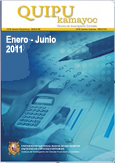SOME PRINCIPLES OF ECONOMIC CONSIDERATIONS IN THE PLANS OF GOVERNMENT OF THE PERIOD 2011-2016
DOI:
https://doi.org/10.15381/quipu.v18i35.3705Keywords:
Libertad económica, inflación, intervencionismo, inversión extranjera.Abstract
The Government's role is to protect and defend life and property of people who are under its jurisdiction (against internal or external aggression) to settle disputes that may arise, and let the people (the other) free to achieve their goals. The role of government is to be guardian of the conditions that enable families and businesses achieve their goals. If the government does that, people could provide for themselves the best. When the government protects the rights of people to do what they want (as do not violate the equal freedom of others to do the same) will do what is born: to work, cooperate and trade with each other. Then, have the incentive to save, accumulate capital, innovate, experiment, seize opportunities and produce. The best policy is to limit government action to create conditions for people to achieve their own goals and live in peace with its neighbors. The role of government is to enable people to enjoy freedom and opportunity to cooperate and trade with each other. Thus, the government creates the economic environment that allows each employer has the right to better serve its customers.
Downloads
Downloads
Published
Issue
Section
License
Copyright (c) 2011 Pablo Rivas Santos

This work is licensed under a Creative Commons Attribution-NonCommercial-ShareAlike 4.0 International License.
AUTHORS RETAIN THEIR RIGHTS:
a. Authors retain their trade mark rights and patent, and also on any process or procedure described in the article.
b. Authors retain their right to share, copy, distribute, perform and publicly communicate their article (eg, to place their article in an institutional repository or publish it in a book), with an acknowledgment of its initial publication in Quipukamayoc .
c. Authors retain theirs right to make a subsequent publication of their work, to use the article or any part thereof (eg a compilation of his papers, lecture notes, thesis, or a book), always indicating the source of publication (the originator of the work, journal, volume, number and date).






